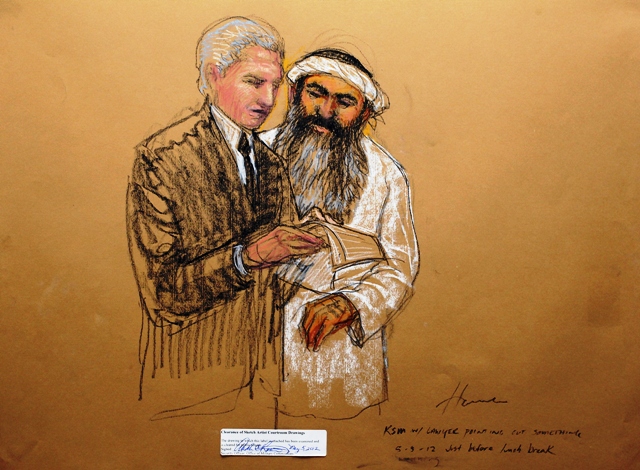
On the second day of a pre-trial hearing, it emerged that microphones resembling smoke detectors were placed in a room where defense attorneys met their clients, and that 32 microphones picked up their discussions in court.
Maurice Elkins, the director of courtroom technology at Guantanamo, said even whispered conversations, spoken in "a very, very low tone," were picked up on an unfiltered audio courtroom feed monitored by a government agency.
Shortly after, Captain Thomas Welsh, a government lawyer at Guantanamo, told the court that on January 31 he had seen a recording device being placed in the meeting room.
"It looks like a smoke detector," Welsh said, noting that it did not look like a normal microphone, and stating that another government lawyer told him not to worry because "we don't monitor any attorney-client meetings."
The disclosures, however, confirmed defense lawyers' worst fears that the client-attorney confidentiality they expected to be observed during legal proceedings at the US military base in Cuba appeared to have been breached.
Testimony relating to recording procedures used at Guantanamo has dominated the latest hearing.
Elkins's admission came during questioning from James Connell, the attorney for one of the five men accused of orchestrating the September 11 attacks that killed nearly 3,000 people and led to the US-backed war in Afghanistan.
The unfiltered circuit was controlled by computer software that monitored everything said in court, Elkins said, unlike the "filtered circuit" relied on by journalists who listen in to the proceedings from behind a glass screen.
Censorship and the conduct of the prosecution against the alleged plotters of the deadly attacks have been a focus of recent hearings.
A military judge overseeing the case ruled last month that the US government had censored a discussion regarding secret CIA prisons, preventing it from being heard outside the courtroom, and ordered such censorship to stop.
The suspected plotters of the attacks against New York's Twin Towers and the Pentagon, as well as the crash of a passenger jet in Pennsylvania, face the death penalty if convicted.
Three of the accused were present during Tuesday's legal arguments, including self-confessed 9/11 mastermind Khalid Sheikh Mohammed, who with the judge's permission was allowed to wear a camouflage jacket in the courtroom.
The government maintains that although the many microphones in the court were capable of capturing all sound, there was no ability to isolate what was being said between defense lawyers and the accused.
Prosecutor Clayton Trivett likened it to being in a restaurant where many conversations are going on at the same time.
But David Nevin, Mohammed's defense lawyer, appeared skeptical, noting that "these very sensitive microphones can pick us up from a variety of locations, correct?"
"You don't know what the OCA is doing with the sound that they receive," Nevin said to Elkins, referring to the "original classification authority," or the agency that handles the recordings.
This week's pre-trial hearing at Guantanamo is being viewed by reporters via a television link at Fort Meade, a military base in Maryland outside the US capital.
On Monday, following Nevin's objections, Judge James Pohl ordered that the microphones used by legal counsel use a "push to talk switch," instead of the "push to mute switch" used previously to prevent inappropriate listening in.
The government's chief prosecutor, General Mark Martins, said on Monday that no inappropriate recording of conversations was taking place.
"I can say unequivocally that no entity of the United States government is listening to, monitoring or recording communications between the five accused and their counsel at any location," Martins said in a statement.







1732354127-0/Untitled-design-(3)1732354127-0-270x192.webp)


1732344836-0/BeFunk_§_]__-(37)1732344836-0.jpg)






COMMENTS
Comments are moderated and generally will be posted if they are on-topic and not abusive.
For more information, please see our Comments FAQ